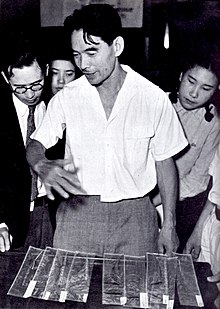Hitoshi Kihara
Hitoshi Kihara ( Japanese 木 原 均 , Kihara Hitoshi ; born October 21, 1893 in Tokyo , † July 27, 1986 ) was a Japanese geneticist.
Kihara studied plant physiology at the University of Hokkaidō with the degree in 1918 and was from 1920 assistant at the University of Kyoto , where he received his doctorate in 1924. From 1924 to 1927 he was studying abroad in Europe (including in Germany with Carl Correns ) and the USA. From 1927 to 1956 he was a professor at Kyoto University. Shortly before his retirement he became director of the Japanese National Institute for Genetics in 1955, which he remained until 1969, and was then director at the Kihara Institute for Biological Research , which he founded in Kyoto in 1942 (later in Yokohama ), which he headed until 1984 .
Kihara was a genetics pioneer in Japan. He was mainly concerned with the genetics of wheat. He introduced the concept of the genome while studying the wheat chromosome set. Then he studied the evolution and origin of wheat by studying chromosomes, for which he undertook expeditions to Afghanistan and Iran.
He developed disease and pest resistant varieties of wheat.
He was a member of the Japan Academy. In 1958 he was elected to the National Academy of Sciences , 1959 to the American Academy of Arts and Sciences and 1965 to the American Philosophical Society , in 1960 he became a member of the Leopoldina . In 1948 he received the Order of Culture and in 1959 the Darwin plaque . In 1983 the Japanese Society for Genetics donated the Kihara Medal.
He was an avid skier and led the Japanese team at the Winter Olympics in 1960 and 1964 and was a member of the organizing committee for the 1972 Sapporo Winter Olympics .
Web links
Individual evidence
- ^ Member History: Hitoshi Kihara. American Philosophical Society, accessed October 23, 2018 .
- ↑ Hitoshi Kihara's membership entry at the German Academy of Natural Scientists Leopoldina , accessed on October 22, 2015.
| personal data | |
|---|---|
| SURNAME | Hitoshi, Kihara |
| ALTERNATIVE NAMES | 木 原 均 (Japanese) |
| BRIEF DESCRIPTION | Japanese geneticist |
| DATE OF BIRTH | October 21, 1893 |
| PLACE OF BIRTH | Tokyo |
| DATE OF DEATH | July 27, 1986 |
